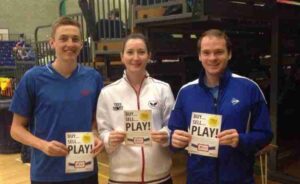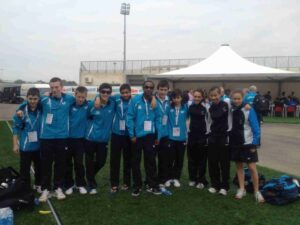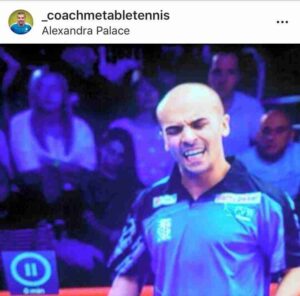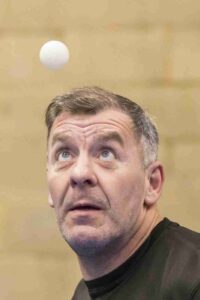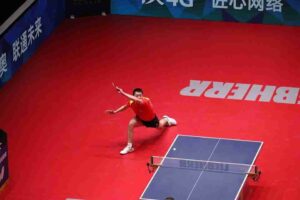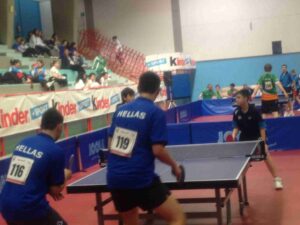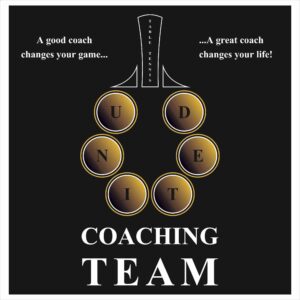It’s a very difficult question to answer, how important are parents in table tennis, or as a sporting parent in general?
Personal experience:
Many know by now from previous blogs my story. A single parent and a single child, but did my circumstances enable or disable me?
My mum was very supportive in terms of giving me free will. This enabled me to express myself as a competitor and I thoroughly loved representing myself when competing. If I lost, I was upset with myself but took full responsibility. If I won, I had done me proud and I may have received a small tap on the back from mum and a few others.
Self-pressure:
I enjoyed the self-pressure and more often than not performed under pressure. My mum never came to watch me play. I did not have a coach or corner support which meant whether I won or lost, the outcome was not amplified from external sources. The aim is to impose personal pressure in order to achieve and like many I am my own worst critic. Something I like to do is bet on myself but never gamble on external entities. Unfortunately, self-pressure only lasts for so long! As I got better I also got a coach, friends and family would start to support me. The pressure increased more and more and playing for big clubs in England and Europe, changed everything!
Pressure:
This is my weakness, and as external support increased, I felt the pressure to perform for others. I really struggled to control my nerves, often wanting to win for my supports and teammates. I was not used to playing for anyone but myself.
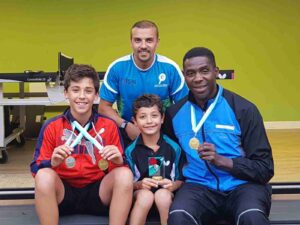
One small event called Maccabi Open was clear proof that I struggled to perform when others support me. I was the best and most well-known player in the event. All the young players, parents and even opposing players inflicted pressure on me to win the event each year. For 10 years I lost in the semi’s or final, I was unable to control my nerves. If you took the external pressure away I may have won the event 8 out of the 10 years. I wanted to perform so much for the people who supported me and instead of the support elevating me, it deflated my performance. Aged 29, I finally crossed the line, I became more accustomed to the pressure and my close family did not attend for the first time. I was also able to focus on secluding myself from people on the day due to experience. Even though the tournament is insignificant in the grand scheme of table tennis, it was a huge success in my mind. I was able to absorb the external pressure and managed to handle my nerves.
Handling Pressure, internal and external
I was accustomed to self-pressure and enabled myself on most occasions to perform at my personal peak. Unfortunately, I was not exposed to external pressures and when they sneaked into my playing career it changed my whole world. I believe if want to be great at any given industry we must learn to develop ourselves under both scenarios. Self and external pressures.
Parents contribution:
I’ve read many books and seen many world champions and world-class athletes achieve because of their parent’s or loved ones supporting them.
For example Lewis Hamilton, Tiger Woods, William sisters, Timo Boll, Federer, Mayweather etc.
All of these extraordinary athletes achieved because of their supportive parents.
It’s a balance:
I do believe parents have a huge role to play in making their kid’s special but I also believe they can destroy them too. I’ve witnessed parents so hard on their kids the child often quits, sometimes they may also resent the parents. Worse case, again I’ve witnessed this, the child and parent fall out and communication is broken.
It’s a fine line between support and pushing your child, (often) the parent push due to ‘personal dreams’.
Good sporting parents:
The secret in my mind;
1. Provide opportunity (find what your child loves and enable them to pursue a pathway in that field.
2. Support but don’t push, this means to guide them in the right direction but don’t push them there.
3. Love, the number one rule, show love to your child regardless of the result. Express your belief in them but at the same time make them understand that a result does not define them. And they are your special one and you love them regardless of any given result.
How to develop regardless of your personal circumstances:
1. Communication
If you feel pressure from your parents, then the first thing to do is communicate. Often parents will put pressure on their kids unintentionally, even sitting in the corner quietly can have an effect on the child.
Tip: When I first started coaching I wanted my players to win so much I was nervous, anxious and even angry sometimes. Kids have a sixth sense they feel your anxieties subconsciously and even though you may think you’re not showing it they feel it. Like when someone walks into a room very angry, they may not say anything and try not to show it but more often than not we feel the tension in the room. I’ve learnt to really stay calm and be compassionate with my players. Now, I am controlled in the corner, show signs of; belief, support and focus. This enables me to enjoy the performance and give the best advice possible.
We forget to enjoy the performance! Do your best to stay positive regardless of the situation rather than allow your emotions to have an effect on the player.
2. Handling external pressure
Everything we do (that we good at) is due to one fact developmental repetition. If you struggle in a certain area the only way to develop it, is to do it over and over again with a purposeful outcome.
Roger Federer, said many years ago walking into a Wimbledon final (the crowd, stadium, family, friends and supporters overwhelmed him) he thought he was going to faint. Years later that environment has become very normal to him. Because he has repeated that scenario so many times.
*We must go from an uncomfortable environment to making it comfortable via purposeful repetition.
3. Understand 2 things:
Those that support us want us to win but they will still like or love us when we lose, sometimes even more so.
Pressure is a choice we make, a tournament is no different to a training hall, the difference is a title and maybe prize money. The game is the same the pressure has been amplified via your personal thoughts. The best in the world know how to switch off all the outside noise and focus on producing what they do in practice.
Side thought
Interesting thought, the superstar athletes mentioned above, where or are in an individual sport. Team sports as much as parents are involved in the background it does not seem to have the same effect as it does on an individual sport. Is this because the team and coach are practically your families? Parents are not allowed to be involved as much because the team help and drive each other on!
Purposeful repetition, support, guidance and love no matter what are the keys to success. With this in mind, we can all achieve great things!
Written by Eli Baraty
eBaTT (Eli Baraty Academy of Table Tennis)
Coach Me Table Tennis
– – – – – – – – – – – – – – – – – – – – – – – – – –
Instagram: _elibaraty
Twitter: @elibaraty
FB: Coach Me Table Tennis
– – – – – – – – – – – – – – – – – – – – – – – – –
W: www.coachmetabletennis.com
M: 07900401144

